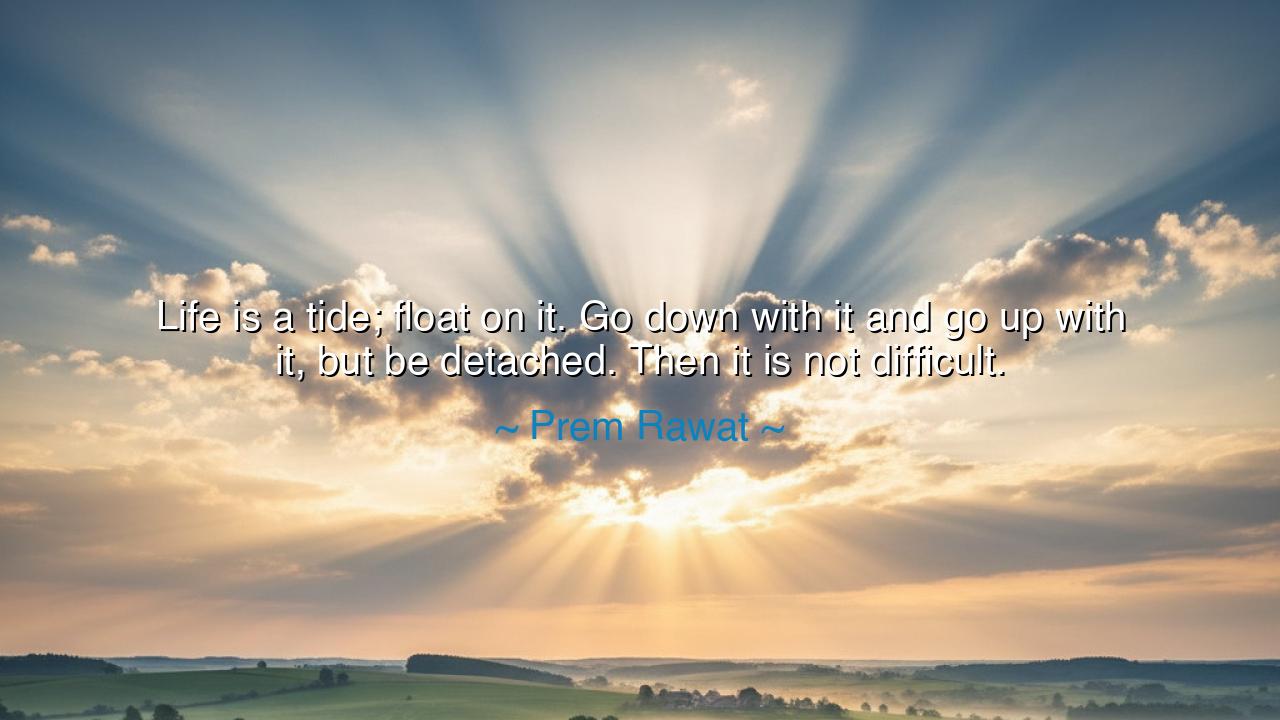
Life is a tide; float on it. Go down with it and go up with it
Life is a tide; float on it. Go down with it and go up with it, but be detached. Then it is not difficult.






“Life is a tide; float on it. Go down with it and go up with it, but be detached. Then it is not difficult.” – Prem Rawat
In this tranquil yet profound saying, Prem Rawat, the teacher of inner peace, offers wisdom as old as the sea itself. He likens life to a tide, ever rising and falling, ebbing and flowing, beyond our command yet carrying us always forward. To float on it is not to surrender in weakness, but to move in harmony with the rhythm of existence. His words remind us that life’s ease or hardship does not lie in the waves themselves, but in how we meet them. When we resist the natural movement of things—when we cling to joy or flee from sorrow—we exhaust the spirit. But when we learn to be detached, to accept both ascent and descent as part of the same ocean, then even the storm becomes bearable, and the voyage serene.
The origin of this wisdom is found in the great traditions of the East—echoes of the Bhagavad Gita, the Tao Te Ching, and the teachings of the Buddha. They all speak of balance, of calm in the midst of impermanence. Prem Rawat, though a modern teacher, speaks with the same ancient cadence: that detachment is not indifference, but freedom from being enslaved by what rises and falls. The tide will not cease for our struggles; the only mastery is acceptance. Like the Taoist sage who lets the river carry him, Rawat calls us to trust life—to ride its motion with an untroubled heart.
Consider the ocean itself. The tide does not apologize for its coming nor linger in its leaving. It follows the pull of the moon, vast and steady, and every creature within it learns to adapt. So too must we. When happiness arrives, let it wash over you like sunlight on calm waters. When pain comes, let it pass through without anchoring your soul in bitterness. To go down with it and go up with it is to recognize that both are part of the same sea. The wise man does not curse the waves; he learns to swim.
There is a tale of an ancient sailor who once tried to fight the tide. Every morning he rowed his small boat against its pull, sweating and straining, believing he could conquer it by strength. Years passed, and he grew weary and bitter, for the sea always won. One day, an old fisherman watched and said, “Why do you battle what was never your enemy? Turn your boat with the tide, and it will take you farther than you could ever go alone.” The sailor listened, and for the first time, he felt the effortless power of the current carrying him. So too with life—when we cease resisting the inevitable and learn to move with it, peace dawns where once there was only struggle.
Detachment, as Rawat teaches, is not coldness. It is warmth without possession, love without demand, effort without fear. To be detached is to know that nothing truly belongs to us—not the highs nor the lows, not even the breath we take. The detached heart feels deeply, but it does not drown in feeling. It acts with compassion, yet remains calm amid outcomes. Such a one may laugh in joy or weep in sorrow, but through it all remains anchored in stillness.
Let us remember this in the chaos of our days. When fortune lifts us high, let us not cling to the crest of the wave, for it will fall as surely as it rose. When hardship pulls us low, let us not despair, for the tide will turn again. The ocean of life is vast and eternal, but our peace depends on our detachment—our willingness to float, not fight.
So, my child of the changing sea, learn the art of surrender. Do not harden your heart against the rhythm of existence. When joy visits, be grateful. When sorrow lingers, be patient. When uncertainty stirs the waters, trust that beneath the surface there is always calm. For life is a tide, and those who learn to float upon it find that no wave can overwhelm them. The wise do not conquer the sea—they become one with it, and in that oneness, they discover the deepest peace of all.






AAdministratorAdministrator
Welcome, honored guests. Please leave a comment, we will respond soon